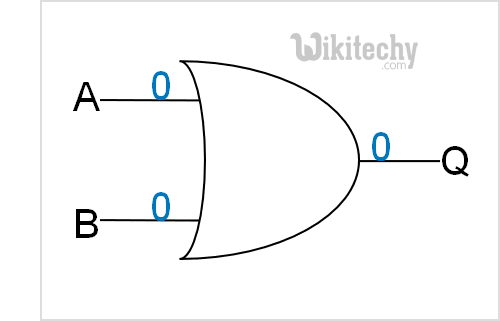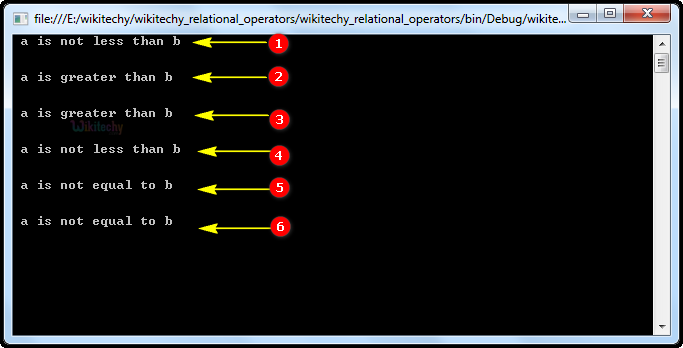C# Relational Operators - c# - c# tutorial - c# net

C# Relational Operators
What are the Relational Operators in C# ?
- Relational operators are used to find the relation between two variables, i.e. to compare the values of two variables in a C# programming.
- Some of the relational operators are listed below,

Relational Operator
| S.no | Operators | Example | Description |
|---|---|---|---|
| 1 | > | a > b | a is greater than b |
| 2 | < | a< b | a is lesser than b |
| 3 | >= | a >= b | a is greater than or equals to b |
| 4 | <= | a <= b | a is lesser than or equals to b |
| 5 | == | a == b | a is equals to b |
| 6 | != | a != b | a is not equals to b |
C# Sample Code - C# Examples:
using System;
using System.Collections.Generic;
using System.Linq;
using System.Text;
namespace wikitechy_relational_operators
{
class Program
{
static void Main(string[] args)
{
int a = 10;
int b = 5;
if (a < b)
{
Console.WriteLine(" a is less than b");
}
else
{
Console.WriteLine(" a is not less than b");
}
if (a > b)
{
Console.WriteLine(" a is greater than b");
}
else
{
Console.WriteLine(" a is not greater than b");
}
if (a >= b)
{
Console.WriteLine(" a is greater than b");
}
else
{
Console.WriteLine(" a is not greater than b");
}
if (a <= b)
{
Console.WriteLine(" a is less than b");
}
else
{
Console.WriteLine(" a is not less than b");
}
if (a == b)
{
Console.WriteLine(" a is equal to b");
}
else
{
Console.WriteLine(" a is not equal to b");
}
if (a != b)
{
Console.WriteLine(" a is not equal to b");
}
else
{
Console.WriteLine(" a is equal to b");
}
Console.ReadLine();
}
}
}
Code Explanation:

- Here int a = 10 is an integer variable value as 10.
- int b = 5 is an integer variable value as 5.
- In this statement we are using the relational operator lesser than (a < b) for the condition of checking 10 < 5, which will be not satisfied because a=10 and b=5, so the output go to the else statement "false", which will be printed in the statement "a is not less than b".
- In this statement we are using the relational operator greater than (a > b) for the condition of checking 10 > 5, which will be satisfied because a=10 and b=5, so the output set as "true", which will be printed in the statement "a is greater than b".
- In this statement we are using the relational operator greater than or equals to (a >= b ) condition of checking here 10>=5 will be satisfied because a=10 and b=5, so the output set as "true", which will be printed in the statement "a is greater than b".
- In this statement we are using the relational operator lesser than or equal to (a < = b) for the condition of checking 10 <= 5, which will be not satisfied because a=10 and b=5, so the output go to the else statement "false", which will be printed in the statement "a is not less than b".
- In this statement we are using the relational operator equal to (a == b) for the condition of checking 10 == 5, which will be not satisfied because a=10 and b=5, so the output go to the else statement "false", which will be printed in the statement "a is not equal to b".
- In this statement we are using the relational operator not equals to ( a != b ) for the condition of checking here 10 != 5 will be satisfied because a=10 and b=5, so the output set as "true" , which will be printed in the statement "a is not equal to b".
Sample C# examples - Output :

- Here in this output, we have shown the "a is not less than b", which specifies to else statement. Because the less than (a < b) relational operator condition is not satisfied.
- Here in this output, we have shown the "a is greater than b", which specifies to greater than (a > b) the relational operator condition is satisfied.
- In this output, we have shown the "a is greater than b", which specifies to greater than or equal to (a >= b) the relational operator condition is satisfied.
- In this output, we have shown the "a is not less than b", which specifies to else statement. Because the less than (a <= b) relational operator condition is not satisfied.
- Here in this output, we have shown the "a is not equal to b", which specifies to else statement. Because the equal to (a == b) relational operator condition is satisfied.
- Here in this output, we have shown the "a is not equal to b", which specifies to not equal to (a != b) relational operator condition is satisfied.
